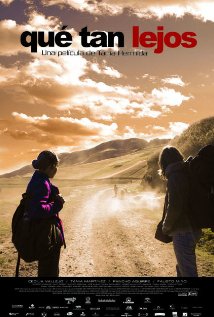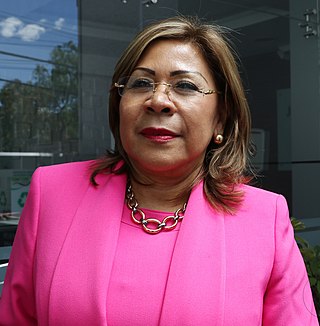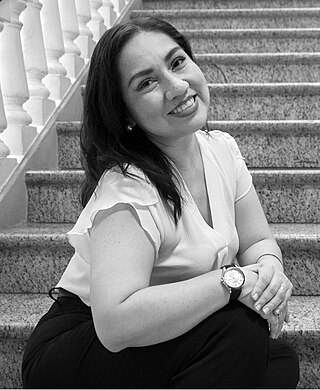Same-sex marriage has been legal in Ecuador since 8 July 2019 in accordance with a Constitutional Court ruling issued on 12 June 2019 that the ban on same-sex marriage was unconstitutional under the Constitution of Ecuador. The court held that the Constitution required the government to license and recognise same-sex marriages. It focused its ruling on an advisory opinion issued by the Inter-American Court of Human Rights in January 2018 that member states should grant same-sex couples "accession to all existing domestic legal systems of family registration, including marriage, along with all rights that derive from marriage". The ruling took effect upon publication in the government gazette on 8 July.

Qué tan lejos is a 2006 film directed by Ecuadorian filmmaker Tania Hermida. The film is a road movie co-produced by Ecuador and Spain, and it stars Tania Martinez and Cecilia Vallejo as an Ecuadorian student and a Spanish tourist, respectively, who met each other in a bus and take rides together when the roads are blocked because of a strike.

Gabriela Alejandra Rivadeneira Burbano is an Ecuadorian politician. She was President of the National Assembly of Ecuador between May 2013 and May 2017. Previously she was Governor of Imbabura Province from 2011 to 2012.

Gina Godoy Andrade is an Ecuadorian politician, feminist and supporter of LGBTQ rights. She is currently the representative in the National Assembly for the province of Guayas and is the vice president of the Justice Commission of the Assembly.

Annabella Emma Azín Arce is an Ecuadorian politician, doctor of medicine, and wife of Álvaro Noboa. She is president of the Crusade for a New Humanity Foundation, caring for those afflicted by disease for over 20 years.

Andrea Priscila Crespo Granda is an Ecuadorian writer.

Angela Isadora Peñaherrera Jácome is an Ecuadorian actress, television producer, and guitarist.

Ruth Coello is an Ecuadorian television and theater actress and director specializing in improvisation. She is married to a childhood friend, Hugo Avilés, and they have two children.

Fernando Marcelo Balda Flores is an Ecuadorian politician.
Aleyda Quevedo Rojas is an Ecuadorian poet and journalist. She is considered one of the most relevant voices in contemporary Latin American poetry.

Jorge Eduardo Velasco Mackenzie was an Ecuadorian writer and professor. His most popular novel is El rincón de los justos (1983) about Guayaquil's lumpen proletariat.

Lucía de Lourdes Sosa Robinzon is an Ecuadorian teacher, engineer, and politician, who was prefect of Esmeraldas Province from 2005 to 2013 and 2014 to 2018, and was mayor of the city of the same name from 2019 to 2023.

Solange Rodriguez Pappe is an Ecuadorian professor and short-fiction writer.

The Supercopa Ecuador is an annual one-match football official competition in Ecuador organised by the Ecuadorian Football Federation (FEF) to be played by the champions of the Ecuadorian Serie A and the Copa Ecuador of the previous season, starting from 2020. This competition serves as the season curtain-raiser and is scheduled to be played in late January or early February each year, one week before the start of the season.

Sofía Rosado is an Ecuadorian lyrical soprano, pianist, cellist, and harpist. Her style is oriented to classical music, the Ecuadorian music and the Andean sanjuanito. She is the daughter of the composer and writer Sebastián Rosado.
Claudia Elena Schiess Fretz is an Ecuadorian beauty queen crowned Miss Ecuador 2011 and represented her country in the Miss Universe pageant that same year. On October 22, 2011, she won Miss American Continent 2011; becoming the first Ecuadorian to achieve this title.
Álvaro Manzano Montero was an Ecuadorian opera and symphony orchestra conductor.

Maribel Vanessa Caicedo Vernaza is an Ecuadorian track and field athlete.

LGBT literature in Ecuador, defined as literature written by Ecuadorian authors that involves plots, themes or characters that are part of or are related to sexual diversity, had its earliest exponent in the short story Un hombre muerto a puntapiés, published in 1926 by Pablo Palacio, became the first Ecuadorian literary work to openly address homosexuality.

This article presents a timeline of the most relevant events in the history of LGBT people in Ecuador. The earliest manifestations of lesbian, gay, bisexual, and transgender (LGBT) people in Ecuador were in the pre-Columbian era, in cultures such as Valdivia, Tumaco-La Tolita, and Bahía, of which evidence has been found suggesting that homosexuality was common among its members. Documents by Hispanic chroniclers and historians—such as Pedro Cieza de León, Gonzalo Fernández de Oviedo y Valdés, and Garcilaso de la Vega—point to the Manteño-Huancavilca culture in particular as one in which homosexuality was openly practiced and accepted. However, with the Spanish conquest, a system of repression was established against anyone who practiced homosexuality in the territories that currently make up Ecuador.
















